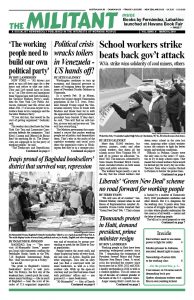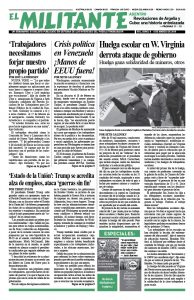Washington continues to turn up economic and financial pressure in hopes of bringing down the government of President Nicolás Maduro in Venezuela.
In a speech Feb. 18 in Miami, where the largest émigré Venezuelan population in the U.S. lives, President Donald Trump urged the Venezuelan military brass to break with Maduro and throw their lot in with the opposition led by self-proclaimed president Juan Guaidó. If they don’t, he said, “You will find no safe harbor, no easy exit and no way out. You will lose everything.”
The Maduro government has maintained a course that pushes working people out of politics and demoralizes them. That’s why in the midst of the capitalist economic and social crisis there the imperialist rulers in Washington feel they’re in a stronger position today to press for the fall of Maduro.
The U.S. government froze U.S. bank accounts of the Venezuelan government and its state-owned PDVSA oil company on Jan. 28. It has also blocked the sale of raw materials needed to process oil in Venezuela.
Working people need to oppose Washington’s interference with Venezuela’s sovereignty and demand U.S. Hands Off!
Outcome of Chávez, Maduro course
The economic, social and political crisis in Venezuela is the consequence of the political course followed by the government of Hugo Chávez that came to power in 1998, a course continued by Maduro since Chavéz’s death in 2013.
Chávez, a military officer, was elected president in 1998 amid a working-class uprising. His final election rally was 700,000 strong.
Chávez called his political course the Bolivarian Revolution and sometimes 21st Century socialism, which he sharply differentiated from the Cuban Revolution, where Fidel Castro and the July 26 Movement led workers and farmers to take political power. Instead, Chávez and Maduro used income from oil sales to fund welfare programs that fostered workers’ dependency, and attempted to “manage” the capitalist economy. This diversion from a course toward taking power began the process of demobilizing Venezuelan toilers.
In Cuba the communist leadership of the revolution led by Castro encouraged workers control and carried out a deep agrarian reform that guaranteed that peasants could work their own land — transforming the island’s workers and farmers into the masters of their own destiny and opening a socialist revolution.
In Venezuela production and land remained in the hands of the capitalist class.
Ostensibly to encourage production and make importing of necessary materials easier, Chávez set up a system where capitalists could buy dollars at a lower rate than on the “free” market. This became a huge source of corruption, especially with capitalists most allied to the government. They made a killing in an endless cycle of buying dollars cheap, then reselling them on the black market, instead of using them to buy needed imports.
The government and military bureaucracy mushroomed. The state-run oil industry was plundered by bosses and bureaucrats while some of the profits were used to fund the government’s welfare programs. When the price of oil was high, this masked the underlying contradictions. But when oil supplies on the world market were glutted, the price of oil plummeted.
The government tried to keep funding their welfare programs by printing money to make up for the short fall, sparking out-of-control inflation — now over 1 million percent this year. No matter how often Maduro raises the minimum wage, it can’t keep up with daily price increases. Government-subsidized products are scarce. Workers seeking necessities end up standing in lines for hours in hopes of finding something.
The resulting crisis and depoliticization of working people has opened the door for Guaidó and greater interference by Washington.
What the U.S. rulers hate the most about the Chávez and Maduro governments are the friendly ties these governments have had with the Cuban Revolution. Tens of thousands of Cuban internationalist volunteers have spent time over the past 20 years in Venezuela, staffing medical clinics, including in the most isolated areas, participating in literacy campaigns, and helping to train the army. And the Venezuelan government sent oil to Cuba at low prices.
Maduro says there isn’t a crisis
Despite the conditions that have led some 3 million people to flee the country, Maduro has repeatedly denied there is a crisis.
In a Feb. 7 “Open letter to the people of the U.S.,” Maduro claimed that the U.S. government is “waging a military attack on Venezuela under the pretext of a nonexistent humanitarian crisis.”
Denying the existence of the crisis gives a handle to the cynical maneuvers of the U.S government and Guaidó, who shed crocodile tears about the suffering people of Venezuela to present themselves as fighters for humanitarian aid.
The opposition and Washington have said they intend to deliver a convoy of aid to help Venezuelans into the country Feb. 23. Maduro says it isn’t needed and won’t be permitted.
According to the Wall Street Journal, three U.S. military cargo planes brought supplies to the Colombian border town of Cúcuta Feb. 16. Their “humanitarian” aid? Hygiene kits with soap and toothbrushes. And nutritional bars for just 3,500 kids. They say they will be sending a few hundred tons, which would not make a dent in the crisis.
The U.S. rulers are using the crisis in Venezuela to slander and, they hope, to isolate the Cuban Revolution. In his Feb. 18 speech in Miami President Trump called Maduro “a Cuban puppet.” Washington and Guaidó have been promoting bald-faced lies that the Cuban advisers in the army are directing torture and repression against Maduro’s opponents.
Developments in Venezuela are dangerous for working people there and for the Cuban Revolution. The only road forward is for workers and farmers to organize and follow Cuba’s example, take political power into their own hands, and overthrow capitalist exploitation and oppression.

